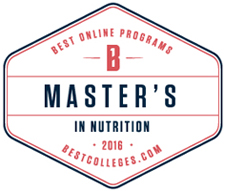
Program Overview
The Master of Science in Nutrition (online) program combines advanced study in nutrition
with a unique, competency-based curriculum that provides nutrition and health professionals
with a broad perspective of current issues in nutrition research and ethics, health
promotion and healthy aging, counseling and communications, and public health and
program planning. The program emphasizes ways to incorporate new research, evidence-based
applications, and entrepreneurial skills into the practice of nutrition.
Students in the M.S. in Nutrition may choose a concentration in Entrepreneurial Nutrition
Practice or Community Nutrition and Wellness. All courses in the M.S. in Nutrition
are offered online, allowing learners to earn the degree completely online.
This program prepares students for a variety of career opportunities in business,
government, health care, and education. Graduates work in private practice, nutrition
education, school systems, food and pharmaceutical industries, clinical and corporate
research, community organizations, hospitals, public health agencies, worksite wellness
and health promotion programs, supermarkets, and fitness facilities.
Please note: this program does not provide eligibility to sit for the National Registration
examination to become a registered dietitian/nutritionist (RDN), nor does it provide
eligibility (i.e., verification statement) to apply to a dietetic internship.
Unique Elements of This Program
 Ranked in the top 15 nationwide by Best Colleges.com.
Ranked in the top 15 nationwide by Best Colleges.com.- Concentrations in Entrepreneurial Nutrition Practice, Community Nutrition and Wellness are available.
- Multidisciplinary classes on ethical issues in the delivery of health services.
- Courses offered online.
- Elective courses designed to meet personal objectives.
- Choice of an academic portfolio, action research, or master's thesis capstone option available.
How You Will Benefit
Upon completion of the M.S. in Nutrition, students will have received advanced academic training and will be prepared to:
- Translate nutrition theory to different target populations and apply current nutrition research to evidence based nutrition practice.
- Demonstrate professional leadership through the communication of nutrition research using professional activities such as grant writing, peer reviewed journal publications and/or professional level presentations.
- Recognized the psychological, social, and ethical factors that influence health and nutrition practices and the impact on delivery of nutrition services from different perspectives.
Degree Requirements
- A total of 30 credits that include multidisciplinary based courses, advanced nutrition and metabolism, professional communications, current topics in prevention nutrition, and research-related courses.
- The remaining electives can be taken with an emphasis that meets the student's individual plan.
- The academic portfolio, action research, or master's thesis project may be designed within the emphasis area.
Admission Requirements
- Completed application
- Official Transcripts
- Current Resume
- Two Letters of Recommendation
- 500-word Personal Statement (1-2 pages)
*Unofficial transcripts, resume, letters of recommendation and essay can be submitted as part of the online application.
For International Students:
- Official transcripts from all post-secondary institutions. International transcripts must be evaluated by NACES (i.e. WES) on a course by course basis.
- TOEFL/IELTS (if necessary)
Program Options
Option A:
Designed for the Registered Dietitian or student who has recently completed a supervised practice program accredited or approved by the Accreditation Council for Education in Nutrition and Dietetics of the Academy of Nutrition and Dietetics Students accepted under Option A may be eligible to receive up to nine graduate credit hours towards their degree if graduate level courses were completed during their dietetic internship and meet program requirements. Credits must be pre-approved by the graduate program director.
Option B:
Intended for the person with a baccalaureate degree in foods, nutrition, and/or dietetics
(non-RD) or the person with a baccalaureate degree in a non-nutrition area who desires
an advanced degree in nutrition. All applicants must have completed the prerequisites
for the graduate program in nutrition including: Introductory and organic chemistry,
statistics, human physiology, biochemistry, and advanced nutrition (or the equivalent).
Note: Option B pathway does not make a student eligible for a dietetic internship. Students interested in becoming
a Registered Dietitian/Nutritionist (RD/RDN) who have an undergraduate degree in a
non-nutrition area are advised to pursue the Second Degree in Nutrition and Dietetics.
Option C:
Designed for the student seeking a combined M.S. in Nutrition and Dietetic Internship
Program. To apply to this option, see the Dietetic Internship Application materials
at www.steu.edu/di. Applicants to this option must participate in the Dietetic Internship Centralized
Application Services (DICAS) and D&D Digital computer matching.
Upon successful completion of the combined M.S. in Nutrition and Dietetic Internship
Program, the student earns an M.S. in Nutrition and a Verification of Dietetic Internship
Completion and is eligible to sit for the National Registration Examination for Dietitians
(RD/RDN). To apply to this option, see the Dietetic Internship Application materials
at www.steu.edu/di. Applicants to this option must participate in the Dietetic Internship Centralized
Application Services (DICAS) and D&D Digital computer matching. See separate program
admission and program requirements available at www.steu.edu/di.
Contacts
For additional program information, contact:
Anne Buison, Ph.D., RDN
Chair of Foods and Nutrition Program
(973) 290-4065
apellizzon@steu.edu
